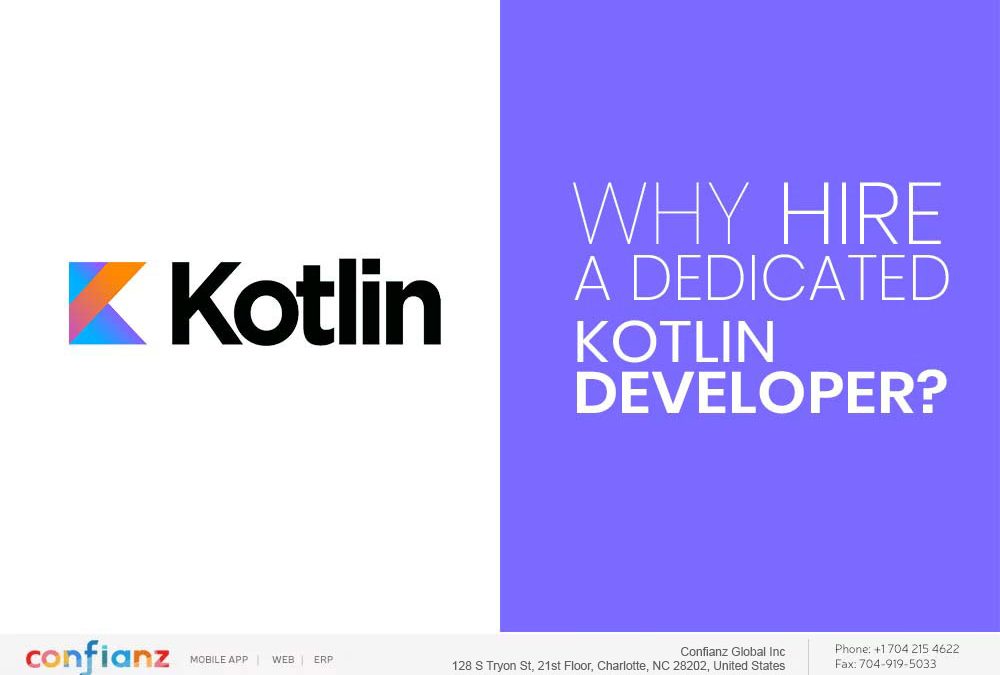One fascinating aspect of the mobile app world is the differences in the scale of various operations. Some apps are run by a team of thousands. Others are created and maintained by a skeleton crew.
This dynamism is part of the attraction of mobile apps since it’s possible to create a successful and competitive app with a minimal crew. However, it’s entirely possible to overdo it on this front and wind up with a team of people all wearing too many hats and not wearing them well.
That’s why, when you’re picking your team, you need to determine what roles need to be filled by someone doing one thing so they can do that thing exceptionally. So, we’re here to tell you why one of those people should be a Kotlin developer.
What is Kotlin?
Kotlin is a programming language that is cross-platform and general-purpose. The project is open-source, and it was designed and developed by JetBrains. Unlike industry standards, C++ and Java, which were released in the last millennium, Kotlin is a product of the 2010s.
While it was first announced in July 2011, the first stable release came out in February 2016. In 2017, Google announced it had added Kotlin as a new programming language to Android, with support similar to Java.
It made waves in 2019 when Google announced Kotlin as its preferred programming language for Android. Now, Kotlin is the most widely used programming language on the Google app store. It makes up over 70% of the top apps.
Google has put their money where their mouth is. Many of their apps are written in Kotlin, including some of their most popular ones. Big names like Netflix and Cash App use Kotlin as well.
What is Kotlin Used For?
As a general-purpose language, Kotlin has a multitude of uses. It works for server-side, web, and desktop development, as well as Android. While support for macOS and iOS is still in the works, Kotlin can still be used in cross-platform app development.
Using Kotlin Mobile SDK, you can write one codebase for the business logic of Android and iOS apps instead of having to retool code for a new platform. Developers will only have to write new code when it’s necessary for the platform.
Why Should You Use Kotlin?
When Java has been a standard for so long—and for good reason—developers have to ask themselves if it’s worth making the switch. So, what sets Kotlin apart from other programming languages?
The main thing is that Kotlin was built to fix them.
The program was inspired by Java and was built to correct some of its most significant issues. The creator, Andrey Breslav, said the language was written for “a big Java codebase whose developers want a better language.”
Although programmers will appreciate the finer points, the gist of it is Kotlin is a lot simpler, more understandable, and easier to use than Java.
Using Kotlin means your app will be faster and leaner with less room for error. It also takes less time to write the code, which reduces development time. In an industry where most consumers expect an app to launch within 3 seconds, every line counts.
Java is very, very old, and it has some issues that still haunt the language to this day. For example, the NullPointerException, also known as the Billion Dollar Mistake, was made in 1964. It is still responsible for the lion’s share of app crashes to this day.
Kotlin has learned from all these mistakes. As a result, it isn’t susceptible to the NullPointerException, eliminating the leading cause of app crashes and making your app more reliable.
In addition, Kotlin was designed to integrate with Java. So even if you already have an app on the market, you can gradually make the switch.
Why Hire a Dedicated Kotlin Developer
There are specific cases when hiring someone for a particular role reduces the number of people needed. With a programming language this versatile, you’ll be able to produce code faster that is useful in more situations.
If You’re Working with Android
It’s a no-brainer to hire a Kotlin developer if you’re working in Android. It’s faster, easier, and more dependable, and the finished product will be less prone to bugs and crashes.
Chief advocate for Android Chet Haase has stated, “We understand that not everybody is on Kotlin right now, but we believe that you should get there.”
Luckily, the language is straightforward to learn. The Kotlin FAQ says the program was “inspired by existing languages such as Java, C#, JavaScript, Scala, and Groovy.” In addition, it was made with accessibility in mind “so that people can easily jump on board, reading and writing Kotlin in a matter of days.”
At the same time, Kotlin warns that some of the more complicated aspects take longer to master, so it’s still worth hiring someone with experience to build your mobile app.
If your app is already written in Java, you have a few options to make the switch to Kotlin. You can opt for a total rewrite, slowly translating the code to Kotlin. Or, you can add to the existing code since it’s fully interoperable with Java.
If You’re Working with iOS
Hiring someone specializing in an Android language might seem less important if you’re developing an iOS app. However, it’s a fantastic move for the long game.
If you program your iOS app using Kotlin when you can, half the work of programming an Android app is already done. This makes migrating your app a cinch, as well as making updates easier.
Kotlin also asserts that the language is easy for iOS developers to learn since it’s not built on foreign concepts.
Need a Kotlin Developer? Let’s Talk
While most programming languages are relics at this point, Kotlin has its roots in the past and its eyes on the future. With all its features and improvements, it’s easy to see why you should hire a Kotlin developer for your mobile app needs.
If you need to hire a mobile app developer, StackBench is here to help! Contact us today for a free consultation.
Recommended Reading:
How much does it cost to create an App?
We’re available to help build your mobile app, whether you want it made for Android, iOS, or both. You can get an estimate for your app using the Confianz app cost calculator.







